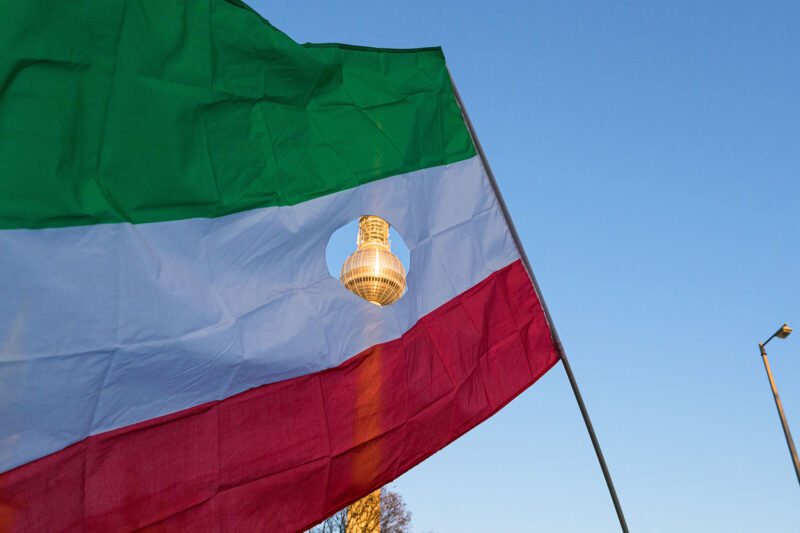The internet is filled with cheap, inaccurate Rumi merch
Selling his quotations can be a lucrative side hustle — but it risks secularising the Sufi poet’s Islamic identity

For many of us, January can represent an opportunity for personal change and transformation. To Ayşe Marin, however, the start of the new year means good trade. The 40-year-old online business owner will routinely earn hundreds of extra euros over the month from an international customer base, all seeking spiritual inspiration and enlightenment.
“It can sometimes be too much,” said Marin. “Sometimes, I wake up very early in the morning and see that I have received over 100 orders overnight.”
Marin, who is from Istanbul but lives just outside Berlin, isn’t a spiritual guru, though. The mum of two, who also works part-time as an administrative assistant at a high school, runs a small business on Etsy, a popular e-commerce platform focused on bespoke craft items, where she sells poster prints of well-known “spiritual” and “inspirational” quotations. Among her bestsellers are those featuring quotations from the ancient Chinese philosopher Lao Tzu and lines from Meditations — the journal written by the Roman emperor Marcus Aurelius between 161 and 180 AD.
In the past few years, however, Marin has found that her January orders are routinely filled by customers seeking life-affirming quotations from one historical figure: the 13th-century Sufi poet Jalaluddin Rumi.
The Etsy vendor doesn’t have much familiarity with Rumi’s writings, other than a handful of short poems she’s read online or that were sent to her by prospective customers. But she has sold dozens of Rumi posters, emblazoned with quotations attributed to the Persian poet such as “O time, without me don’t go” and “O sky, without me don’t change”.
If these aphorisms sound familiar, it’s likely that you’ve come across them via a social media infographic, more often than not posted on pages associated with New Age philosophies, focusing on wellness and holistic therapy. Quotations attributed to Rumi can receive thousands of likes, and hundreds of shares across digital platforms. On Booktok, an influential section of TikTok where book reviews can receive thousands — and sometimes millions — of comments, Rumi poetry is frequently ripe for mass online engagement.
In 2017, Rumi was cited by the New York Times as America’s best-selling poet
The poet’s popularity on the internet long precedes the era of the Instagram influencer, of course. Over the years, Rumi has been cited by many celebrities, including Brad Pitt, Tilda Swinton and Gwyneth Paltrow, as being instrumental in their “spiritual journeys”. Paltrow’s ex-husband, musician Chris Martin, cited Rumi poems as a source of comfort during their “conscious uncoupling”, later incorporating The Glass House into the Coldplay song Kaleidoscope.
Meanwhile, in 1999, Madonna, Goldie Hawn and Donna Karan all featured on a compilation album of Rumi poems, produced by a then obscure New Age philosopher called Deepak Chopra. Translations of Rumi’s poetry also routinely feature on bestseller lists. In 2017, he was cited by the New York Times as America’s best-selling poet.
Marin is just one of many independent traders on platforms like Etsy who are able to make a small fortune selling prints of Rumi quotations. A cursory search for the poet on Etsy brings up dozens of pages’ worth of merchandise, ranging from T-shirts and coffee cups to jewellery and kitchenware. Moreover, the rise of print-on-demand services such asRedbubble — which allows third parties to print anything they want onto most materials in an instant — means that Rumi iconography is more prevalent than ever, and can be found on unexpected items such as bedsheets and even bottles of vodka.
It’s unknown how much the “Rumi industry” is worth in financial terms. That said, the “self-help” industry in which his quotations can often be found is an extremely lucrative market worth tens of billions of dollars. Influential people with big social media followings can earn thousands of dollars posting motivational quotations on their social media feeds. It’s also not uncommon for copywriters — some of whom simply re-publish motivational quotations — to earn up to $6,000 a day from a viral post, more than most people bring home in a month.
“Rumi was a great writer, so it makes sense that anything attributed to him will be popular on the internet,” said Muhammad Ali Mojaradi, a writer and poetry translator based in Detroit, Michigan, who is also the editor of the website Persian Poetics. “The long-term effect is that it gives people who share Rumi quotes the air of spiritual authority, even when the way the quotes are shared is mainly to re-inforce people’s egos”.
Mojaradi went viral on Twitter in May 2020 after posting a thread detailing how many popular Rumi quotations being spread around social media were either bad translations for American audiences or, in some cases, complete fabrications.
He compared the continued proliferation of inaccurate Rumi quotations to the wider problems of misinformation online. He also believes that Rumi’s online commodification points to a deeper problem — one where Rumi is framed as a motivational guru for Western audiences and is secularised and detached from his position as a prominent figure in Islamic history:
“It’s ironic that someone who is a Sufi, and whose writings showed his deep commitment to religion, is presented as a commodity on to which people can project anything, that his Islam is a very vague marker of his identity,” Mojaradi said.
Though exposing more people to Rumi’s writings is a positive development, Mojaradi warns that social media algorithms provide little incentive to share and discuss Sufi poetry. “The purpose of these quotes, whether it’s Rumi or Sun Tzu, isn’t to share wisdom or knowledge, but to gain followers by making people feel good,” he said.
The Etsy vendor Marin, meanwhile, sees her online business as a way to promote positivity at a time when there is “so much bad news in the world”. And while she says she checks that the quotations she prints are correct using Google searches, she believes that her customers are more interested in the poetry.
“Poetry is all about sharing love,” she said. “That is what we all need right now.”
 Newsletter
Newsletter








